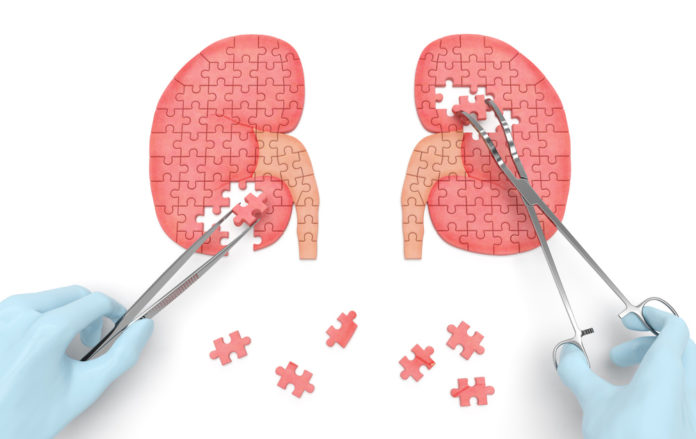The two kidney bean-shaped organs are about the size of two fists. They are located below the rib cage on both the left and right sides.
The primary role of the kidneys include:
- Filters blood and excretes waste products.
- Regulate sodium, potassium, phosphorus and calcium levels in the bloodstream.
- Help control blood pressure.
- Produce a hormone called erythropoietin (EPO), which signals and stimulates bone marrow cells to produce new red blood cells.
Each kidney contains millions of units called nephrons that work to filter waste. If their function becomes compromised, the rest of the body may be too. Most of the concern relates to waste buildup, which can be very dangerous and even fatal.
But what actually is renal disease, what causes it, and can it be prevented?
What Is Renal Disease?
Renal disease is a gradual progression and measured based on the glomerular filtration rate (GFR), or estimated glomerular filtration rate (eGFR). GFR serves as a biomarker for how well the kidneys are filtering nitrogenous waste products out of the bloodstream.
The five stages are broken down into 5 stages depending on their GFR based on milliliters per minute (mL/min). These include:
- Stage 1 (eGFR = 90 to 130): Kidney damage, but normal to increased kidney function
- Stage 2 (eGFR = 60 to 89): Mild decrease in kidney function
- Stage 3 (eGFR = 30 to 59): Moderate decrease in kidney function
- Stage 4 (eGFR = 15 to 29): Severe decrease in kidney function
- Stage 5 (eGFR = Less than 15): Kidney failure with treatment necessary, defined as ESRD
Clinically recognized as end-stage kidney disease, end-stage renal disease (ESRD) is the final stage of chronic kidney disease (CKD).
Causes & Symptoms of Chronic Kidney Disease
Renal disease often passes gradually through the stages. There are two primary causes of renal disease, including uncontrolled diabetes and hypertension (high blood pressure).
Regular high blood sugars and pressures can damage the blood vessels and kidney’s anatomy, therefore disrupting its physiology. Age increases the risk for these two conditions, so renal disease often follows on the heels.
Other causes and risk factors of ESRD include:
- Kidney stones
- Congenital abnormalities
- Certain types of cancer
- Lupus
- Glomerulonephritis (inflammation of the kidney’s filters, known as glomeruli)
- Family history of the condition
Common symptoms of ESRD include:
- Malaise (a general ill feeling) and weakness
- Nausea and vomiting
- Loss of appetite and weight loss
- Muscle cramps
- Dry and itchy skin
- Metallic taste in mouth
- Neurologic impairment
The severity of symptoms likewise depends on the stage of renal. For instance, prolonged and uncontrolled CKD can lead to anemia. This is due to lowered erythropoietin hormone levels resulting in fewer red blood cells being produced in bone marrow.
Treating & Managing Renal Disease
As indicated in stage 5, ESRD requires treatment, as the kidneys are no longer able to function effectively.
Primary treatment options include dialysis or kidney transplant while considering diet, psychological support, or palliative care.
Dialysis
In ESRD, dialysis is required to filter the blood, excrete the waste products, maintain fluid balance.
Without dialysis treatment, the toxic byproducts start to build and are more than likely fatal.
Kidney Transplant
When it comes to ESRD, kidney transplantation is the only alternative treatment to dialysis. In fact, a successful kidney transplant can allow you to live the way you previously did prior to kidney disease.
Qualifying candidates may further require immunosuppressant therapy to best ensure a successful transplant.
Nutrition Therapy
Specific diet recommendations are established by the National Kidney Foundation throughout all stages of renal disease.
For the most part, nutrients of concern include protein, sodium, phosphorus, and potassium. Monitoring fluids is likewise important, especially when on dialysis. Supplementing with micronutrients also may be warranted.
Palliative Care
Especially in seniors or chronically ill patients, offering them palliative care may be the best option. The focus of palliative care is to relieve the symptoms and stress of a serious illness.
Overall, the ultimate outcome is to improve quality of life.
Psychological & Emotional Support
End-stage renal disease can be considerably stressful, no matter the decision of treatment. Psychological support may be justified to alleviate stress or reduce the risk of depression.
Family members and close friends may also benefit from structured counseling, especially if they assist in the provision of care.
How to Prevent Renal Disease
About 90 percent of end-stage renal disease patients have chronic diabetes and hypertension. That being said, one can keep the kidneys healthy by preventing or managing conditions that cause kidney damage.
Prevention mostly entails adopting a healthy lifestyle such as diet, exercise, and weight management. Other factors, including sleep hygiene and stress management, are helpful as well.
Consume a Balanced Diet
A balanced diet should offer a variety from whole foods, including:
- Whole grains
- Fruits and veggies
- Beans and other legumes
- Nuts and seeds
- Fish and shellfish
- Lean cuts of animal meats
- Low-fat dairy products
Likewise reduces the intake of refined foods rich in refined flour, oil, sugar, and salt. These sorts of products mainly supply empty calories and have negative impacts on health if consumed in excess.
Exercise Regularly
Regular exercise elevates heart rate, improves blood flow, and manages weight. Being active lowers the risk of disease, too, therefore keeping the kidneys healthy.
Aim for at least 30 minutes of aerobic exercise most days of the week. Include two to three resistance training sessions weekly, too.
All-in-all, dismiss a sedentary lifestyle and adopt an active one. At the end of the day, some movement is better than going without!
Lose or Maintain Weight
Carrying excess weight increases the risk of diabetes, high blood pressure, and ultimately renal disease.
However, reaching and sustaining a healthy weight can prevent or help manage these conditions.
Consider Other Lifestyle Factors
Diet and exercise are dominant lifestyle factors for sustaining kidney and overall health. But other factors to consider include:
- Sleeping for 7 to 9 hours on a nightly basis.
- Managing daily stress with positive coping techniques.
- Moderating alcohol intake.
- Smoke cessation.
Overall, consult with a doctor for early detection and management of chronic diseases. They can help layout a lifestyle plan and prescribe any medication if warranted.
References:
U.S. National Library of Medicine. End-stage renal disease. https://www.nlm.nih.gov/medlineplus/ency/article/000500.htm.
Your Kidneys & How They Work. National Institute of Diabetes and Digestive and Kidney Diseases. https://www.niddk.nih.gov/health-information/kidney-disease/kidneys-how-they-work. Published June 1, 2018.






